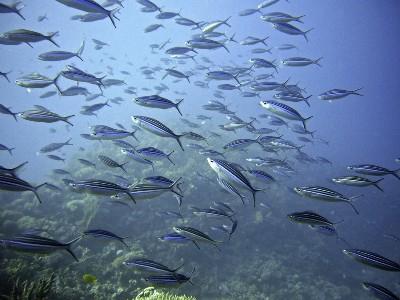KOCHI, 14 APRIL 2018: Considering their commercial value in overseas markets, 10 marine fisheries from India have been identified as the targeted fishery for securing the eco-labelling certification of the Marine Stewardship Council (MSC), London.
Blue swimming crab caught in gillnet from Mandapam, Tamil Nadu; shrimp by trawl from Kollam; red ring shrimp by trawl from Kollam; squid by trawl from Kollam; flower shrimp by trawl from Mandapam; cuttlefish by trawl from Kollam; lobster by trap from Nagercoil and Kanyakumari; skipjack tuna by hook and line from Lakshadweep; Japanese threadfin bream by trawl from the south west coast are the ten fisheries identified by a panel of stakeholders in India’s marine fisheries sector.
The panel includes marine scientists, seafood exporters, retailers and fishermen. The panel also decided to start fishery improvement projects (FIPs) for these fisheries under regular stakeholder consultations. A slew of strategies was also formulated by the stakeholders for securing the MSC certification, a necessary endorsement for enhanced access in overseas market.
The panel, which met at the Central Marine Fisheries Research Institute (CMFRI) under the leadership of the MSC, CMFRI and the World Wildlife Fund- India (WWF) to discuss the MSC certification process, agreed that unanimous efforts are required to implement the fishery improvement plans to secure the eco-labelling certification.
Speakers at the stakeholders meet highlighted that over exploitation and unregulated fishing were the major issues which should be controlled to maintain the sustainability of marine fisheries in India. Stressing the need for regular consultation of stakeholders, they called for self-imposed regulations to curb over exploitation and juvenile fishing.
“Self-imposed regulations are need of the hour for maintaining sustainability of fish stocks, reducing environmental impacts and ensuring effective management of the fisheries”, DrYemiOloruntuyi, Head, Developing World Programmes of the MSC said during the panel discussion.
She also said that maintaining sustainability of fisheries was crucial to increasing their acceptability among overseas markets. “Today, it is increasingly a risky a business to sell seafood products that are not sustainable”, she said.
“Sustainability provides competitive advantage creating opportunity for well-managed fisheries. The concept behind eco-labelling is to harness consumer power to usher in positive change in the fisheries sector. The environmental benefits of eco-labelling include improved sustainability of fish stocks, reduced bycatch, improvement of habitat and ecosystem, increased compliance with regulations and ecosystem-based management”, Yemi said adding that currently 28 per cent of fisheries are over exploited.
Presenting the roadmap for obtaining the MSC certification, Dr Sunil Mohammed, Principal Scientist of CMFRI said the certification would bring in enhanced economic opportunities and market access for the fishing industry of the country, in addition to enhanced international reputation for the quality of Indian fishery management.
“The eco-labelling certification will boost India’s share of seafood export which is currently 4%. It will help the fishery fetch a well-accepted markets in European and North American countries”, he said.
“Among the 338 MSC certified fisheries from 36 countries, India has so far obtained only one fishery – short-necked clam fishery in Ashtamudi lake”, Dr Sunil Mohammed said.




















